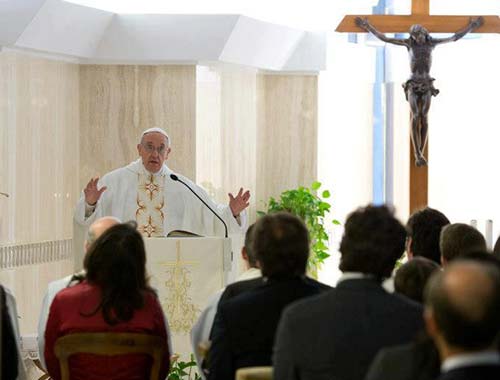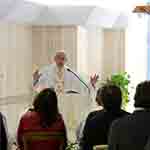
From 1 October 2017, there will be a change in Roman Catholic canon law that will mean that local Conferences of Bishops will be the final arbiters of the liturgical translation used in their region.
Currently, Pope Francis’ motu proprio, Magnum Principium is only available in Latin and in Italian. There is an unofficial English version here.
The canon to be changed is Can. 838.2 and 838.3. Currently §2 reads:
§2. It is for the Apostolic See to order the sacred liturgy of the universal Church, publish liturgical books and review their translations in vernacular languages, and exercise vigilance that liturgical regulations are observed faithfully everywhere.
This will become
§2. It is for the Apostolic See to order the sacred liturgy of the universal Church, publish liturgical books, recognise adaptations approved by Conferences of Bishops according to the norm of law, and exercise vigilance that liturgical regulations are observed faithfully everywhere.
You will notice the addition of “recognise adaptations approved by Conferences of Bishops according to the norm of law”.
As to §3, this currently reads:
§3. It pertains to the conferences of bishops to prepare and publish, after the prior review of the Holy See, translations of liturgical books in vernacular languages, adapted appropriately within the limits defined in the liturgical books themselves.
This will become
§3. It pertains to the conferences of bishops to faithfully prepare versions of the liturgical books in vernacular languages, suitably accommodated within defined limits, and to approve and publish the liturgical books for the regions for which they are responsible after the confirmation of the Apostolic See.
You will notice, “faithfully” has been added. And the significant change: conferences of bishops will from now on “approve” the liturgical translations that they have prepared.
The centralised, Vatican approval, and in fact alteration of vernacular translations, has been mired in controversy, to say the least. The Vatican-approved 2011 English translation insists in being gender-specific exclusivist, is inconsistent, difficult to proclaim, poorly laid out, difficult to understand, and abandoned agreed ecumenical texts and, with it, music.
The NZ bishops’ appeals to the Vatican (for example to allow the contemporary Lord’s Prayer) were ignored.
German, French, and Italian bishops conferences have not given in so easily – and their translations are stalled in agitation.
Many may not realise that there is a perfectly good English-language translation produced painstakingly in 1998 that the Vatican rejected.
Although one might now visualise the English-language version in one part of the planet being different to the version somewhere else (cf. the Anglican family of texts), locally, ecumenical working together might, by this, be repaired. Restoration of our agreed English-language ecumenical texts (and with it the possibility of shared music) is one of my hopes.
The Second Vatican Council was clear: “Translations from the Latin text into the mother tongue intended for use in the liturgy must be approved by the competent territorial ecclesiastical authority mentioned above [the local conference of bishops]” SACROSANCTUM CONCILIUM 36.4
Pope Francis is returning to the teaching of Vatican II.
Some previous posts:
My Our Father gift to the Vatican
opening prayer translation absurdity
Contemporary Lord’s Prayer forbidden
NZ Roman Missal arrives
Pope fails own Latin test?
If you appreciated this post, do remember to like the liturgy facebook page, use the RSS feed, and sign up for a not-very-often email, …




This is very good news from a very good Pope. A heaven-sent Pope I’d say.
There is a fine balance between centralised authority and the local Church, which in the Catholic Church had become far too tilted towards the bureaucrats in Rome.
Many Blessings
Re-arranging the deck chairs , while the Titanic is heading for the icebergs I think.
That’s a rather enigmatic comment, isn’t it, Rein? Which particular metaphorical icebergs did you have in mind? Blessings.
Father B, do you really see the Roman situation as a parallel to the Anglican situation?
The difference that I see is that they are all, every nation, starting with the same exact authorized Latin text, the Ordinary Latin Mass promulgated by the Blessed Pope Paul VI after Vatican II. Because of that, yes, Conferences of Bishops in Anglophone nations will be approving their own translation of the Latin into English, but how different will those texts actually be? English isn’t that different around the world. We all understand one another usually and it isn’t even my first language! Especially if they return to the previously agreed upon ecumenical translations?
However, in the Anglican Communion, we don’t share today a common text such as the Ordinary Latin Mass. We haven’t for a very long time. Yes, we all started with the original texts of the Church of England, but the prayer books that we all use today are vastly different. If I bop up to Vancouver BC and visit the Sunday service in Christ Church Cathedral, it feels comfortable. It feels familiar, but it isn’t the 1979 service that I’m used to, since 1979, first in Spanish and for the last 20 years in English. The shape of the service is the same. There are prayers familiar and there are prayers word for word the same occasionaly, but the two services were not formed from the same starting place as they will be for the Roman Church.
I am happy to see Francis do this. But I fear that it is going to drive a wedge much deeper between him and the ultra-conservative Traditionalists. I couldn’t believe the comments I was reading that arose from an article republished from another source on the Religion News Service website a couple of weeks ago. Some of those people hate this man and believe that he is possessed by Satan and they aren’t afraid to say so and sign their names to it!
Thanks, David. My point about “one might now visualise the English-language version in one part of the planet being different to the version somewhere else” is that it might end up looking like the variety of Anglican versions of the Collect for Purity, or some contemporary renderings of traditional collects, or even psalters.
Yes, I’m very aware of how divisive the papacy is in Roman Catholicism. And how virulent particularly the conservatives are. And how they use digital media. This seems to be a phenomenon beyond RC. I see many moderates and liberals also calling for homogeneity. We live in ‘interesting’ times.
Blessings.
After Vatican II, they have published a so-called “liturgia horarum” in Latin, as well as Mr Bugnini’s last version of the mass etc., all in Latin.
In the French-speaking countries, many things were more adapted than translated. In the divine office, the Latin hymns have been totally dropped, and new new-age and prayer-allergic types of compositions have been substituted instead. Most of the antiphons and “intercessions” were also replaced by new compositions. Even RC who use the “Prière du temps présent” drop the 1970s songs, and replace them by something more “up-to-date”. In the mass, the most obvious change is the traditional “Orate fratres” (still kept by Bugnini), which in RC French missals is substituted by other things.
Dare I say that the lay-chanted portions of the Scripture (introit etc.) have never been translated into French? They always sing modern non-biblical songs instead.
So, in fact, what the French and their pets have been doing for a half-century becomes the norm for the RC over all. I am glad for that. They will have all the freedom to do the weird things they are longing for. That will decredibilise them enough.